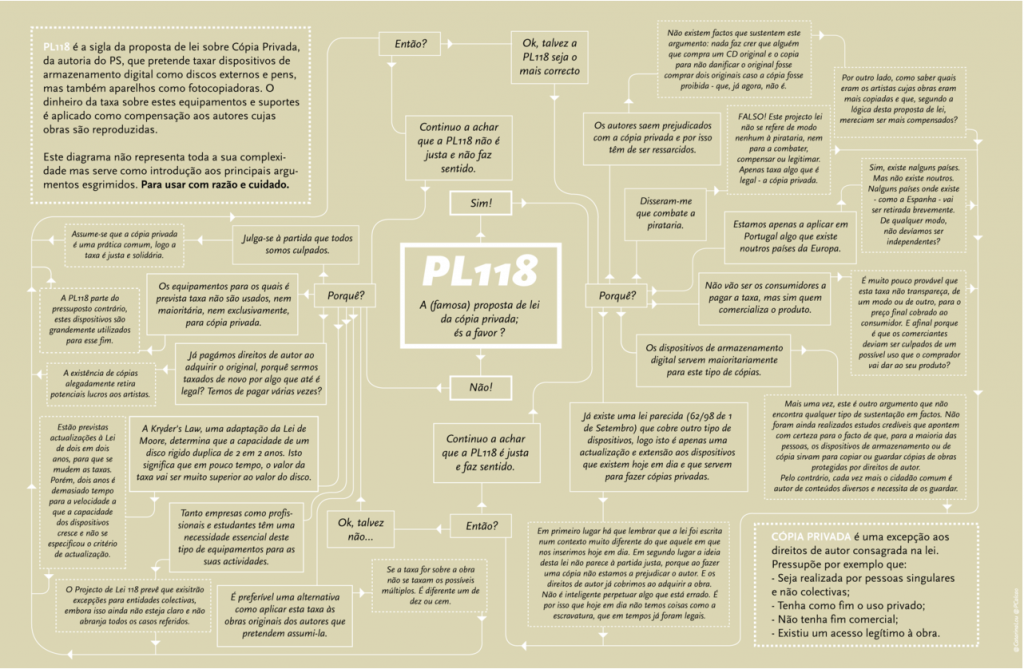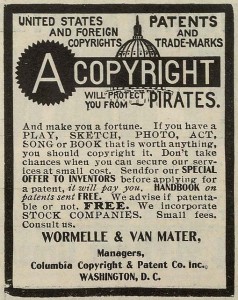The year 2012 has placed on the tips of everyone's tongues a number of acronyms that, in short, wish to establish legal means to enforce compliance with intellectual property and anti-piracy legislation, from the U.S. anti-online piracy bills, SOPA and PIPA, to the multi-national Anti-Counterfeiting Trade Agreement, ACTA.
Portugal has its own, somewhat related acronym, namely PL118 (Projeto de Lei 118/XII), which is a bill intended to tighten restrictions relating to Cópia Privada (private copying) and Direito Autoral (author's rights).
Presented to the Portuguese parliament by the Socialist Party on January 4, PL118 proposes new levies on the sale of any equipment or software capable of recording, copying or storing analogue or digital content. The aim is to guarantee revenue for holders of intellectual property rights which constitutes “fair and reasonable compensation for the damages caused by the social practice of private copying.”
The response in the blogosphere was immediate, with the hashtag #PL118 duly trending on Twitter.

Infograph outlining the most hotly debated questions surrounding PL118. By Catarina Lourenço on Tumblr Designarium (with permission).
The origins of PL118
The Blasfémias blog writes [pt] about the background of lei da cópia privada brought in in 1998 so that, in the name of author's rights, “every time someone in Portugal bought an old video or cassette tape, a roll of camera film, a recordable CD or DVD, video camera, or any other related item, 3% would go directly to authors’ representative organizations.”
The current bill [pt, .pdf] aims to extend the reach of the existing law to digital platforms “by extending the legal framework governing Cópia Privada and by altering article 47 of the Código do Direito de Autor (Author's Rights Code) and Direitos Conexos (laws relating to author's rights).”

"A copyright will protect you from pirates. And make you a fortune." Photo of a promotional flyer by Ioan Sameli on Flickr (CC BY-SA 2.0)
Such a measure, which would tax manufacturers and importers a certain amount based on the capacity of a piece of equipment, could push up prices [pt] for the consumer, as programmer Carlos Martins [pt] explains:
fazendo com que um disco de 1TB pague mais 20,48 euros (…)
Também os telemóveis ficariam sujeitos a uma taxa de 0,50€ por GB, e nem as impressoras multifunções se livraram… aí passando a ser taxadas em função da velocidade de impressão e do peso, podendo oscilar entre os 8 e os 227 euros.
According to an article published [pt] on the Portuguese culture and current affairs website P3, the revenue generated is managed by the “Portuguese Association for the Management of Cópia Privada (AGECOP), which brings together the Portuguese Society of Authors (SPA), Audiogest and the Portuguese Association of Editors and Booksellers (APEL), amongst others, who subsequently distribute the money amongst their respective associates.”
So how exactly is the money distributed [pt]? Nelson Cruz, from website PC Manias, did the calculations [pt]:
a AGECOP, que colecta e gere a coisa, pode usar em despesas até 20% do montante angariado. Do montante liquido, reserva 5% para um Fundo Cultural do Min. da Cultura e 10% para “acções de natureza cultural ou social, de incentivo à criação cultural e à divulgação e estudo da propriedade intelectual” . Portanto por cada 100€ recolhidos, 60€ sairão da AGECOP. O PL118 divide então “40% para os autores, 30% para os artistas, intérpretes ou executantes e 30% para os produtores de fonogramas e de videogramas”. A parte dos autores e artistas, creio que será gerida/distribuída pela SPA, cujo presidente diz gastar até 10% em despesas. Pelo que temos:
Autores: 24€ – 10% = 21,6€ efectivamente distribuídos
Artistas: 18€ – 10% = 16,2€
Editores/produtores: 18€
Despesas AGECOP/SPA: 24,2€
AGECOP which collects and administers the funds reserves 20% for its own expenses. After this, 5% goes to a Cultural Fund belonging to the Ministry of Culture and 10% is reserved for “cultural or social activities aimed at stimulating cultural production and increasing the study and spread of information on intellectual property”. So for every €100 collected, €60 will leave AGECOP. Of these remaining funds, “40% goes to authors, 30% to artists and performers and 30% to music and video producers.” The proportion set aside for authors and artists will probably be managed and distributed by SPA, whose president has said 10% of which will be set aside for SPA's expenses – which leaves us with the following:
Authors: €24 – 10% = €21.6
Artists: €18 – 10% = €16.2
Editors/producers: €18
AGECOP/SPA expenses: €24.2
On February 5th, following a controversy at the end of January over the falsification of signatures, SPA revealed that more than 200 artists [pt] had signed a petition in favour of the new law. Prior to this, it had released a document entitled “Ten things you should know about the Lei de Cópia Privada”, which was subsequently countered, point by point, by activitist Maria João Nogueira.
Resistance to PL118
Maria João, on her blog Jonasnuts and a dedicated Facebook page, has been keeping an extensive log of everything that has been published in the blogosphere [pt] and on mainstream media [pt] about PL118. She was also one of the organizers of an online petition [pt] launched on January 29th entitled “Prevent Taxation of the Information Society”.
The counter-arguments of that petition focus on the origins of the proposed law, which was drawn up exclusively by those “entities which will profit, either directly or indirectly, from the imposed taxes”. They also criticize its content, which is based on “false pretexts”, and take issue with its “inescapable” and “inalienable” nature, as well as the “extreme rise in prices” and the “negative consequences” it implies.
Within a few hours the petition had gained over 1000 signatures and now numbers close to 8000, which means it has already passed the 4000 [pt] signatures minimum which enable it to be used in an official capacity.
In response to pressure from the numerous groups who have come out against PL118, a Parliamentary Working Group was set up under the supervision of the Education, Science and Culture Comission. One of those at its 4th public session [pt] was Rui Seabra, president of ANSOL [pt] – the National Association for Free Software – who, in a letter sent to the parliamentary groups at the beginning of January, has backed the existence of:
um calendário a nível Europeu, que se inicia já no início do ano com a negociação entre várias partes interessadas, e que tem como data informal de término durante o Verão de 2012, para debater exatamente este tema, com o objetivo de delinear uma diretiva e homogeneizar as medidas relativas à Cópia Privada no espaço Europeu.
A new version of PL118 is already being outlined, however a date has not yet been fixed for a vote on the law. Despite this a few “pro” groups, and many of those “against”, remain in open debate over the subject, on Twitter and in the blogosphere.






